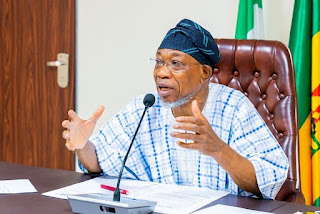There were strong indications on Sunday that in states where parallel congresses were held, the All Progressives Congress would recognize executive councils supported by incumbent governors in the APC states.
A member of the party’s national caucus, who confided in one of our correspondents, also said in non-APC states, the party would recognize congresses endorsed by the highest political office holders in such states.
It was gathered that if the party’s stand was anything to go by, chieftains of the party including Senator Ibikunle Amosun, the Minister of Interior, Rauf Aregbeola, and the Minister of Information and Culture, Lai Mohammed, might lose out in the power tussle in their states.
Violence and protests rocked the APC congresses that were held across the country on Saturday with factions emerging in states including Lagos, Ogun, Kwara, Osun, and Kano.
In Ogun State, a faction loyal to a former Governor of the state, Senator Amosun, which held its congress at the palace of Alake of Egbaland, elected Chief Derin Adebiyi as the chairman.
But another faction supported by the incumbent Governor, Prince Dapo Abiodun, held its congress at the MKO Abiola Stadium, where Chief Yemi Sanusi, emerged as the chairman.
In Kano State, while Governor Abdullahi Ganduje’s faction elected Abdullahi Abbas as chairman, while a rival group led by Senator Ibrahim Shekarau elected Haruna Zago to head the party.
The Lagos State APC congress, which was held at the Mobolaji Johnson Arena Stadium, was attended by Governor Babajide Sanwo-Olu.
Cornelius Ojelade emerged as the consensus chairman at the congress, while a rival faction, Lagos4Lagos, at the Airport Hotel Ikeja, elected Sunday Ajayi from the Agege Local Government to lead the party.
In Osun State, parallel congresses were also held by groups loyal to the state Governor, Adegboyega Oyetola, and his predecessor, Aregbesola.
In Kwara State, groups loyal to Governor AbdulRahman AbdulRazaq and Minister of Information and Culture, Mohammed also elected different officers.
On Sunday, It was gathered in Abuja that in line with its tradition, the APC would accord recognition to the governors and in some cases, the highest political office holders from states where the party was not in power.
A member of the party’s national caucus, who spoke to one of our correspondents on condition of anonymity, “so as not to jeopardize reconciliation efforts” said, “Why will a former governor want to challenge a sitting governor who we all know is the leader of the party in the state? It has been the practice to respect our sitting governors in such matters.”
This, our correspondents learnt, was in response to cases of parallel congresses in Ogun, Kwara, Enugu, and Kano states among others.
Besides APC-controlled states, parallel executive councils also emerged in some states not controlled by the party.
For example in Enugu State, a former Commissioner for Works, Mr Ugochukwu Agballah, and an ex-Chairman of the party, Adolphus Udeh, emerged as chairmen at the parallel congresses held on Saturday.
While Agballah emerged from the faction of a former President of the Senate, Chief Ken Nnamani at a congress held at Destiny Event Centre, Enugu, Udeh emerged from the faction of the outgoing Caretaker Committee Chairman, Dr Ben Nwoye at a congress held at the party’s secretariat.
Agballa, after his election, said that his emergence as state chairman of the party signaled a new dawn for the APC in the state.
Ude on his part, stated, “I want to also commend in a special way the Dr Ben Nwoye-led executive and the Enugu state congress committee for conducting a free and fair election today.”
In Sokoto State, two factions also emerged. A congress, which was held at the party state secretariat, was attended by a former governor of Sokoto State and Senator representing Sokoto Central, Aliyu Wamakko; Senator Ibrahim Gobir, the Minister for Police Affairs, Maigari Dingyadi, former Minister for Transport, Yusuf Suleiman, among others.
Isa Sadiq Acida was re-elected as the chairman at the congress while a splinter faction led by three-term federal legislator Abdullahi Balarabe Silame, produced Muhammad Daji as the chairman.
PUNCH

 BIG STORY5 days ago
BIG STORY5 days ago
 BIG STORY5 days ago
BIG STORY5 days ago
 BIG STORY5 days ago
BIG STORY5 days ago
 BIG STORY4 days ago
BIG STORY4 days ago
 BIG STORY4 days ago
BIG STORY4 days ago
 BIG STORY3 days ago
BIG STORY3 days ago
 BIG STORY2 days ago
BIG STORY2 days ago
 BIG STORY4 days ago
BIG STORY4 days ago
























